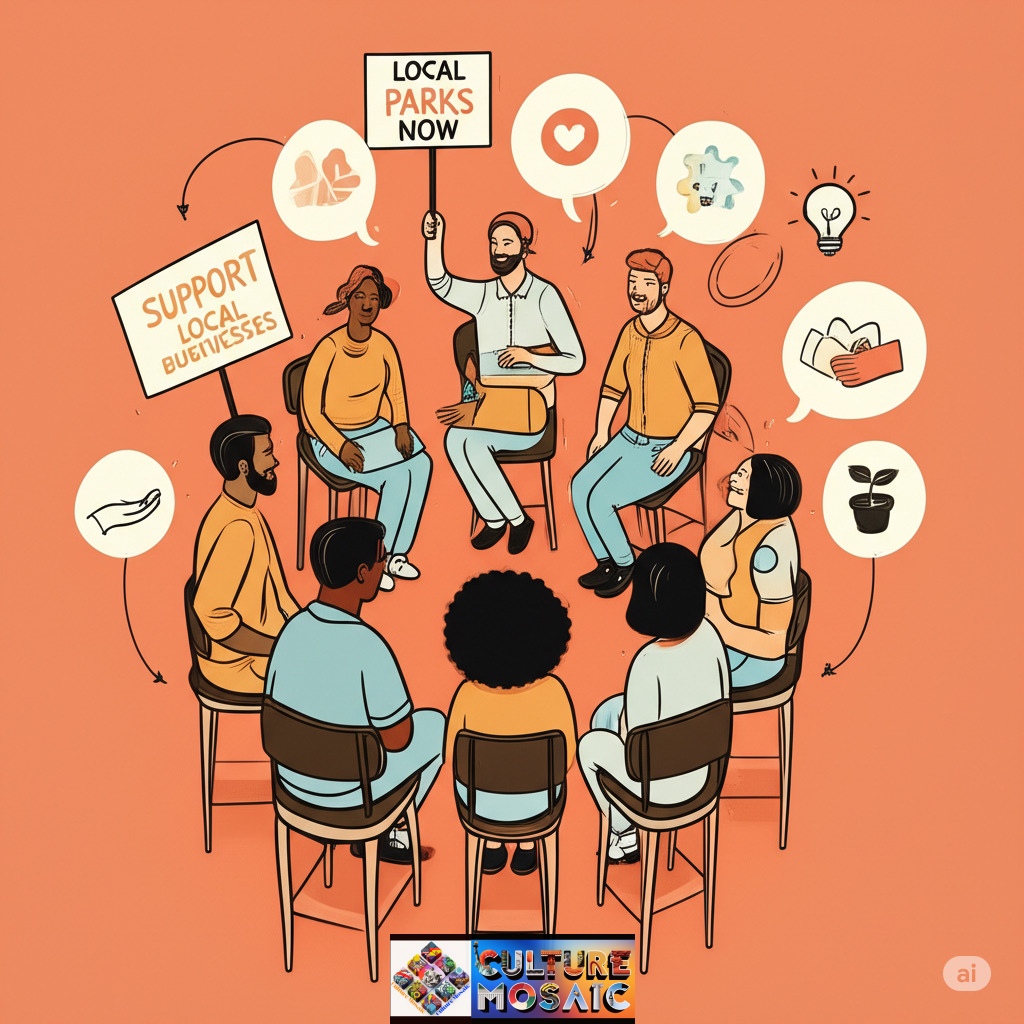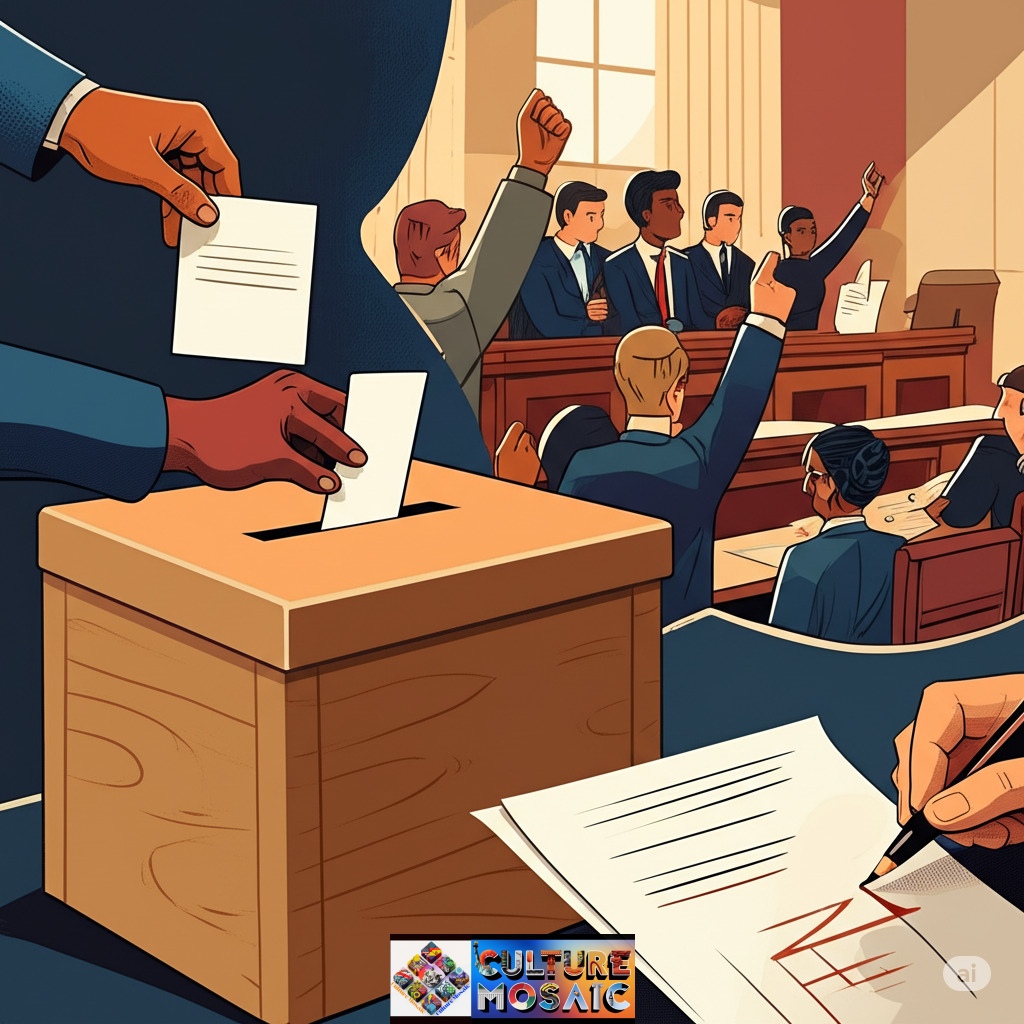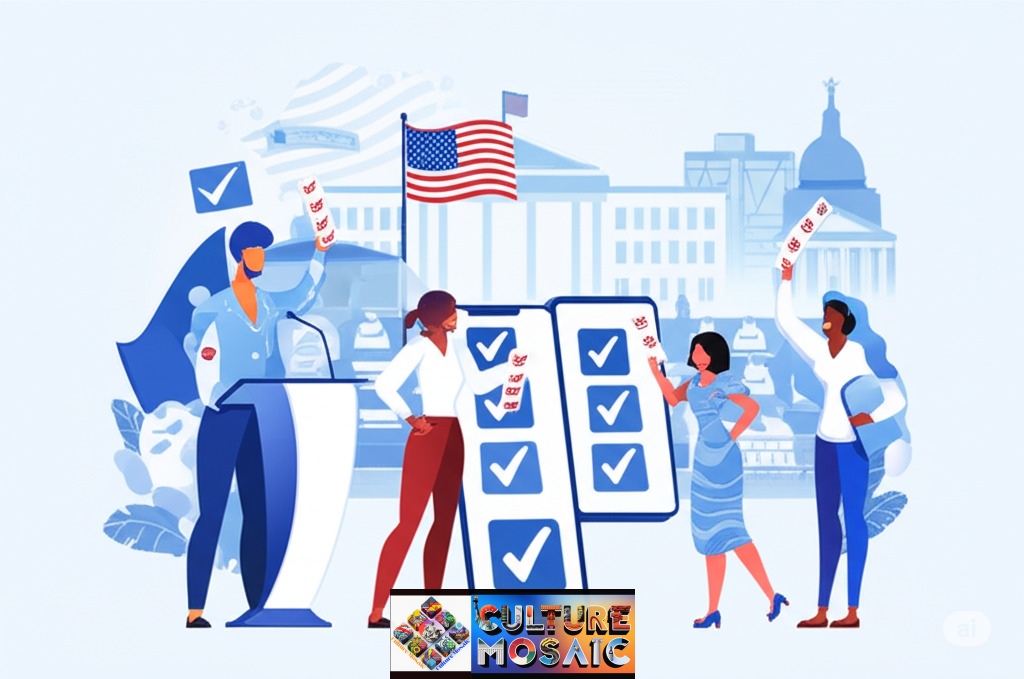Your civic voice is more powerful than you might think. It’s the collection of ways you can participate in your community and influence the decisions that affect your daily life. Whether you’re frustrated with potholes on your street or passionate about education reform, understanding how to use your civic voice effectively can create real change.
In modern-day politics, there are so many different directions to go that lots of folks get lost in the process. They observe issues but don’t know what to do about them. The best part? There are more ways than ever before to be heard, from the old-school ballot to online advocacy tools.
What Is Civic Voice and Why Does It Matter?
Civic voice is your power to engage in public life and shape government policy. It’s more than voting every now and then. Your civic voice encompasses everything from showing up at town hall meetings to sending letters to elected representatives, from getting involved with community groups to marching in a peaceful protest.

The concept matters because democracy only works when citizens actively participate. When people stay silent, important decisions get made without considering their needs and perspectives. Your civic voice ensures that your community’s challenges and aspirations reach the people who can address them.
Consider civic voice a muscle. The more you exercise it, the stronger you get. Ongoing civic engagement develops connections with officials, deepens your knowledge of government, and enhances your impact over the long run.
The Foundation of Democratic Participation
Democracy depends on the idea that government exists to serve people. But this can only occur when individuals interact with their government. Your civic voice is the connection between your everyday experiences and the policy choices that shape your community.
Each great social gain throughout history began with everyday citizens exercising their civic voice. From the suffrage of women to civil rights, from protecting the environment to ensuring workers’ safety, things changed because citizens spoke out and insisted on it.
The foundation isn’t individual participation only. It’s collective action as well. When people come together as communities and speak with a unified voice, they become unignorable. That’s why both individual and collective civic voice are so important to understand.
Historical Context: How Civic Voice Has Evolved

Civic engagement has changed radically across the centuries. Civic voice in early American democracy was reserved for white male property owners. Currently, it involves a much more diverse population and avenues of participation.
The 20th century was marked by enormous expansions of civic voice.
The 19th Amendment provided suffrage to women. The Civil Rights Act broke down barriers which excluded Black Americans. The 26th Amendment reduced the voting age to 18, acknowledging young people’s vested interest in their future.
Over the past few decades, technology has reshaped the way citizens express themselves. Social media enables instant mobilization of grassroots movements. Digital platforms simplify contacting representatives. Online petitions can reach millions of signatures within days. These tools have made civic participation more democratic in ways that earlier generations could not have conceived.
Traditional Modes of Civic Participation
Voting is still the foundation of civic voice, yet it’s only the start. Local elections have just as direct an impact on your day-to-day life as national elections, but they generally have much lower turnout. Your vote packs more punch in these smaller races.
Going to public meetings provides you with direct access to decision makers. City council, school board, and planning commission hearings are where many of the key local decisions are made. These meetings typically provide an opportunity for public comment, an opportunity to make your voice heard directly to officials.
Writing to elected officials in letters or emails is another old but productive way. Officials do read constituent mail, contrary to what many people think. A well-crafted letter on a particular subject can change a representative’s mind, particularly if they receive several letters on the same issue.
Modern Digital Platforms for Civic Voice

Digital platforms have revolutionized how we engage civically. Websites like Change.org make it easy to start petitions that can reach millions of people. Government websites often include online forms for contacting representatives, making communication faster and more convenient.
Social media sites are great civic organizing tools. Facebook groups can schedule neighborhood clean-ups or campaign for local causes. Twitter enables direct contact with government representatives. Instagram and TikTok enable younger activists to spread their message further.
Apps such as Nextdoor link you up with neighbors in your immediate area to tackle hyperlocal problems. Citizen reporting apps allow you to report issues straight to city agencies. Civic participation has never been so immediate and accessible through these online resources.
Building Your Personal Civic Voice Strategy
Building a strong civic voice begins with determining issues of concern to you. You don’t need to juggle every task at once. Choose one or two issues of real concern to you, such as education funding, environmental protection, or economic growth.
Research matters. Know what the current policies are, who decides your problems, and what you want changed. Your knowledge makes your lobbying more credible and persuasive. Officials take well-informed constituents more seriously than those who have not done their homework.
Begin small and expand. Go to one city council meeting. Send one letter to your legislator. Participate in one community group. You can increase your activities and face larger challenges as you become more confident.
Community Organizing and Collective Action
Your individual civic voice matters, but collective action makes your voice louder. When communities mobilize around common issues, they become very difficult to disregard. There’s truth to the idea that numbers confer strength.

Successful community organizing begins with listening. Speak with your neighbors. Hear their issues. Identify common cause. The most effective civic movements deal with issues that touch many in the community.
Coalition-building increases your base. Join and collaborate with already established organizations that have similar aims. Environmental organizations could join forces with public health activists on air quality. Parent organizations could collaborate with teacher unions on school funding.
The Role of Local Government in Civic Voice
Local government tends to be where your civic voice can make the biggest difference. City council, school board, and county commission decisions all impact your life directly. The water you consume, the roads you travel, the schools your kids attend, all come under local purview.
Local officials are more readily available than state or federal officials. They reside in your community. You may see them at the supermarket or town functions. Because of this, they are more apt to be sensitive to constituent concerns.
Knowing how your local government operates will make you a more effective citizen. Learn about how your city budgets. Discover when and where decisions are made. Find out who is responsible for the matters that concern you.
State and Federal Levels of Civic Engagement
Although local involvement may have the most direct influence, state and national concerns influence your life in deep-seated ways. Healthcare policy, tax levels, environmental laws, and civil rights protections all get determined at higher levels of government.

The state government regulates numerous policies that impact everyday life. The funding formulas for education, criminal justice policy, and licensing requirements all occur at the state level. Most individuals ignore state politics, but these choices have a more significant impact than federal ones.
Federal involvement demands other tactics. With millions of constituents to the person, one’s own voice counts less. But persistent groups and long-term campaigns can still have an impact on federal policy. The solution is persistence and coalition building with like-minded people.
Overcoming Barriers to Civic Participation
Most individuals desire to engage civically but encounter actual limitations. Time is a universal factor. Schedules at work, family obligations, and other activities render meeting attendance improbable. Seek other ways to become involved that are compatible with your schedule.
Lack of knowledge about government processes intimidates many potential participants. Don’t let this stop you. Start by learning about one issue or one level of government. Ask questions. Most officials and advocacy organizations welcome newcomers who want to learn.
Geographic barriers affect rural and suburban residents who might live far from government meetings. Digital tools can help overcome these barriers. Many governments now livestream meetings or accept public comment online.
The Effect of Technology on Civic Voice
Technology has made civic participation more democratic than ever before. Social media websites enable instantaneous coordination of citizen movements. Online petitions are able to collect millions of signatures. Live streaming lets citizens join government meetings without being there in person.
Data analysis and artificial intelligence assist advocates in grasping what the public believes and in framing their message more effectively. Mobile apps provide easier access to finding and contacting representatives. Online voter registration and information resources boost electoral turnout.
But technology also presents new challenges. Information overload can drown citizens. Misinformation goes viral. Digital divides ensure that some communities have less access to online civic tools. The solution is using technology as a tool while still retaining human connections and critical thinking.
Civic Voice in Education and Youth Engagement

Youthfulness adds energy and new ideas to civic activity, but youth encounter special obstacles. School calendars clash with state and federal government meetings. They do not have a voting record, so politicians do not know them. Insufficient budgetary resources mean traditional lobbying is not feasible.
Schools are instrumental in building civic voice. Civics instruction teaches fundamental government and democratic involvement. Student government offers direct experience with democracy. Service learning engages classroom learning with real-world issues.
Organizations that work with young people create opportunities for civic involvement. Organizations such as Youth in Government model legislative procedures. Environmental clubs center on climate-related issues. These activities develop skill and confidence for a lifetime of civic engagement.
Economic Considerations and Civic Voice
Economic conditions heavily impact civic voice. Affluent persons and neighborhoods usually exercise more political power. They are able to take a day off work for a meeting. They are able to contribute more to politics. They tend to have stronger ties to those in power.
But economic disadvantage doesn’t take away civic voice. Lower-income residents’ voices can be amplified through community organizing. Coalition building unites people of different economic conditions over common issues. Digital tools minimize some of the costs of civic engagement.
Knowing how economics impacts civic voice makes you create more inclusive strategies. Plan childcare for when you have community meetings. Hold events at times when working-class people can participate. Provide multiple means of communication so you reach a variety of economic groups.
Constructing Inclusive and Representative Civic Voice
Democracy functions most effectively when all members of the community are able to take part. Yet numerous groups are excluded from civic life. Differences in language, cultural unfamiliarity with governmental processes, and historical exclusion all work to keep some communities out.
Constructing inclusive civic voice takes effort. Offer translation at public meetings. Engage cultural and religious organizations. Establish open spaces for individuals who are not familiar with governmental processes.
Representation matters beyond just having diverse participants. Leadership of civic organizations should reflect community diversity. Decision-making processes should consider different cultural approaches to consensus building and conflict resolution.
Measuring the Effectiveness of Your Civic Voice
How do you know that your civic voice is paying off? Begin by creating specific, measurable objectives. Rather than wishing for “better schools,” fight for particular increases in funding or policy shifts. Distinct goals allow you to monitor progress.
Monitor your actions and their results. Did writing to the representative elicit a response? Did going to city council meetings result in policy changes? Did your petition initiate action? Monitoring helps you realize which methods are most effective.
Seek both short- and long-term effects. Policy reform is a long-term proposition, but becoming friends with officials can reap rewards down the road. More civic participation in your community may be just as valuable as certain policy wins.
Future Trends in Civic Engagement
Civic activity is continuing to change at a fast pace. Virtual and hybrid meeting arrangements, created during the pandemic, will probably become here-to-stay options. They enhance access for most individuals but continue face-to-face interactions for those who prefer these settings.
Artificial intelligence has the potential to change citizen-governance interaction. Chatbots potentially can give immediate responses to government inquiries. AI breakdowns of public input could inform officials better about what their constituents prioritize.
Blockchain technology may make possible new kinds of digital voting and petition platforms. Virtual reality has the potential to deliver immersive civic education experiences. But the underlying principles of civic voice will be unchanged: active citizenship, engaged participation, and ongoing advocacy for community betterment.
Frequently Asked Questions About Civic Voice
- What’s the difference between civic voice and political activism?
Civic voice covers all types of participation by citizens in public life, including non-partisan activities such as going to school board meetings or being involved in community planning procedures. Political activism would usually be partisan political causes or candidate campaigns. There is some overlap, but civic voice is a wider term and represents many non-political means to affect your community. - How much time do I need to dedicate myself to being civically active?
Civic activism can work with any schedule. You may spend only 15 minutes a month emailing your representative, or you may volunteer many hours a week with local groups. Begin with what you can sustain regularly. Even small, regular steps can have a real impact in the long run. - Do elected officials really listen to feedback from constituents?
Yes, elected representatives do take notice of constituent feedback, particularly at the local level. They monitor constituent communication and take it into consideration when making decisions. Officials tend to be most responsive to well-educated, specific demands regarding local matters. The trick is being polite, accurate, and specific about what you want. - Can I make a difference as just one person?
Individual voices make a bigger difference than most people appreciate, particularly in city governments. A single person who regularly attends city council meetings will become familiar to government officials and can make a difference. Moreover, individual action tends to generate additional action by others, creating multiplier effects that amplify your impact. - What if I disagree with my neighbors about things that matter?
Democratic participation includes respectful disagreement. Focus on finding common ground where possible, and engage in civil dialogue about your differences. Listen to understand others’ perspectives, even when you disagree. Many community issues have solutions that address concerns from multiple viewpoints if people work together constructively.

